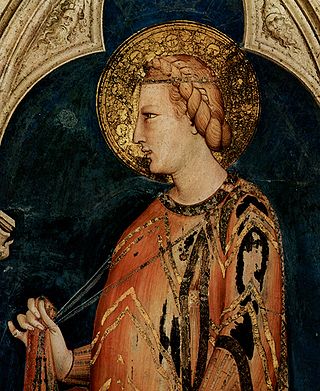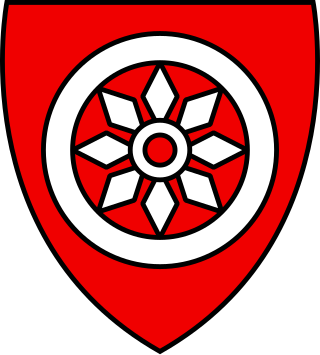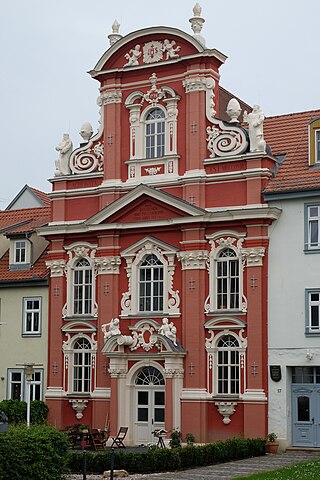
Erfurt (German pronunciation:[ˈɛʁfʊʁt] ) is the capital and largest city of the Central German state of Thuringia. It lies in the wide valley of the River Gera, in the southern part of the Thuringian Basin, north of the Thuringian Forest, and in the middle of a line of the six largest Thuringian cities, stretching from Eisenach in the west, via Gotha, Erfurt, Weimar and Jena, to Gera in the east, close to the geographic centre of Germany. Erfurt is 100 km (62 mi) south-west of Leipzig, 250 km (155 mi) north-east of Frankfurt, 300 km (186 mi) south-west of Berlin and 400 km (249 mi) north of Munich.

Thuringia, officially the Free State of Thuringia, is a state of central Germany, covering 16,171 square kilometres (6,244 sq mi), the sixth smallest of the sixteen German states. It has a population of about 2.1 million.

Reuss was the name of several historical states located in present-day Thuringia, Germany. Several lordships of the Holy Roman Empire which arose after 1300 and became Imperial Counties from 1673 and Imperial Principalities in the late 18th century were ruled by the House of Reuss.

Elizabeth of Hungary, also known as Elisabeth of Thuringia, was a princess of the Kingdom of Hungary and the landgravine of Thuringia.

Mühlhausen is a town in the north-west of Thuringia, Germany, 5 km north of Niederdorla, the country's geographical centre, 50 km north-west of Erfurt, 65 km east of Kassel and 50 km south-east of Göttingen.

Louis IV the Saint, a member of the Ludovingian dynasty, was Landgrave of Thuringia and Saxon Count palatine from 1217 until his death. He was the husband of Elizabeth of Hungary.
Henry of Langenstein, also known as Henry of Hesse the Elder, was a German scholastic philosopher, theologian and mathematician.

The Elector of Mainz was one of the seven Prince-electors of the Holy Roman Empire. As both the Archbishop of Mainz and the ruling prince of the Electorate of Mainz, the Elector of Mainz held a powerful position during the Middle Ages. The Archbishop-Elector was president of the electoral college, archchancellor of the empire, and the Primate of Germany as the papal legate north of the Alps, until the dissolution of the empire in 1806.
Henry of Avranches was a poet of the first half of the 13th century, writing in Latin. He is sometimes assumed to have been born in Avranches, but is otherwise said to have been of German birth with a Norman father. He is described as an itinerant cleric.
Heden, Hedan, or Hetan II, called the Younger, was a Duke of Thuringia, one of the "older" stem duchies (Stammesherzogtums), from around 700 until his death. He may have been the Hedan who married Saint Bilihild.

The Diocese of Fulda is a Latin Church diocese of the Catholic Church in the north of the German state of Hessen. It is a suffragan diocese of the Archdiocese of Paderborn. The bishop's seat is in Fulda Cathedral.

Ludwig II, Landgrave of Thuringia, nicknamed Louis the Iron.

Louis III, nicknamed Louis the Pious or Louis the Mild was a member of the Ludowingians dynasty who ruled as Landgrave of Thuringia from 1172 until his death.
Henricus is a given name. People with the name include:

St. Augustine's Monastery in Erfurt, central Germany, is a former church and monastery complex dating from the 13th century. The site is almost one hectare in size. It was built by Augustinian friars, an order of the Catholic Church. It is most well known as the former home of Martin Luther (1483–1546), the father of the Reformation, who lived there as a friar from 1505 until 1511.

The Erfurt latrine disaster occurred on 26 July 1184, when Henry VI, King of Germany, held a Hoftag at the cathedral provostry in Erfurt. The combined weight of the assembled nobles caused the wooden second story floor of the building to collapse. Most of the attendants fell through into the latrine cesspit below the ground floor, where about 60 of them drowned in liquid excrement. This event is called the Erfurter Latrinensturz in several German sources.
Jordan of Quedlinburg was an Augustinian hermit, influential writer and preacher. He is known for his advocacy of a moderate asceticism.

Erfurt Charterhouse is a former charterhouse, or Carthusian monastery, in Erfurt, Thuringia, Germany. It was founded in the 1370s: building works began in 1372 and the monastery was accepted into the Carthusian Order in 1374. Work started on the church in 1375.
Henry of Friemar the Elder, known as Henry the German, was an Augustinian theologian, preacher and mystic.












